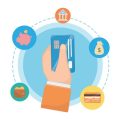Understanding the Real Cost of Payday Loans
When you’re managing on a low income in the UK, payday lenders can seem like a quick fix for financial emergencies. Their adverts are everywhere—from late-night telly to bus stops—promising fast cash with minimal fuss and no credit checks. It’s easy to see why people find them tempting, especially when faced with an unexpected bill or a tight month. However, it’s crucial to recognise the true cost behind these short-term loans. While they might offer instant relief, payday loans often come with sky-high interest rates and fees that quickly spiral out of control. What starts as borrowing £100 until payday can easily turn into owing much more if you’re unable to pay back on time. This cycle of debt traps many people, making it even harder to get ahead financially. Understanding how payday lenders operate—and the long-term impact on your finances—is the first step in finding better solutions and building a more stable money plan for yourself.
2. Making Your Money Stretch: Essential Budgeting Strategies
Living on a low income in the UK can feel like an uphill battle, especially when every penny counts and payday lenders are all too willing to take advantage. However, building a robust budget is your first line of defence. Here’s how you can make your money go further without sacrificing your essentials or peace of mind.
Track Every Pound You Spend
The first step to effective budgeting is understanding where your money actually goes. Keep a spending diary for a month—whether using a notebook, spreadsheet, or a free budgeting app such as Money Dashboard or Emma. Record everything, from rent and bills to that spontaneous coffee at Greggs.
Sample Spending Tracker Table
| Date | Item | Category | Amount (£) |
|---|---|---|---|
| 5 June | Weekly Shop | Groceries | 28.00 |
| 6 June | Oyster Top-up | Transport | 15.00 |
| 7 June | Council Tax | Bills | 90.00 |
| 8 June | Costa Coffee | Treats | 2.80 |
| Total Weekly Spend: | £135.80 | ||
Prioritise Needs Over Wants
Differentiating between essentials and non-essentials is crucial when funds are tight. Focus on core needs like housing, utilities, food, and transport before considering any discretionary purchases. If possible, automate payments for priority bills to avoid late fees or disconnection risks.
Pyramid of Priorities Table
| Priority Level | Examples (UK Context) |
|---|---|
| 1. Essentials | Rent/Mortgage, Council Tax, Utilities, Basic Groceries, Transport for work/school |
| 2. Important Extras | Adequate clothing for weather/job, Mobile phone plan (basic), Internet (if needed for work/study) |
| 3. Non-Essentials/Treats | Eating out, Subscriptions (Netflix, Spotify), Takeaways, New gadgets/clothes (non-urgent) |
Cull the Non-Essentials Ruthlessly
If the sums still aren’t adding up after prioritising needs, it’s time for some tough choices. Go through bank statements and highlight subscriptions or services you rarely use—think magazine subscriptions or gym memberships during winter months. Consider cheaper alternatives for must-haves; swap branded groceries for supermarket own-labels or shop at discount retailers like Aldi or Lidl.
A Few Quick UK-Specific Savings Tips:
- Check if you’re eligible for council tax reduction or other local authority support schemes.
- Use comparison sites like Uswitch or MoneySuperMarket before renewing utilities or insurance.
- Loyalty schemes (Nectar, Tesco Clubcard) can shave pounds off regular shops.
- If you travel by train or bus often, look into railcards or season tickets.
- Avoid payday loans by seeking help from local credit unions or organisations like StepChange if you’re struggling with debts.
The more intentional you are with each pound spent, the less likely you’ll be caught short before payday—and the easier it becomes to sidestep expensive borrowing traps.

3. Maximising UK Benefits and Support
When your income is stretched thin, making the most of available support is vital for staying financially afloat and avoiding payday lenders. The UK offers a range of government benefits, local council schemes, and community initiatives designed to help those on low incomes boost their budget.
Understanding Government Benefits
The first step is to check your eligibility for national benefits such as Universal Credit, Housing Benefit, Child Benefit, or Personal Independence Payment (PIP). These can provide regular support with living costs, rent, childcare, or disabilities. Use tools like the Turn2us Benefits Calculator or Entitledto to see what you might claim – many people miss out simply because they don’t realise what’s available.
Local Council Aid
Your local council may offer additional help through discretionary housing payments, Council Tax Reduction schemes, emergency grants, or vouchers for food and utilities. Councils also run Local Welfare Assistance Schemes that can provide short-term support if you’re struggling due to a crisis or unexpected expense. Visit your council’s website or Citizens Advice for details on how to apply.
Community Resources and Charities
Beyond official channels, there’s a strong network of community organisations ready to lend a hand. Food banks, run by groups like The Trussell Trust, can supply essential groceries if you’re in urgent need. Community fridges and local pantries offer affordable food options. Debt advice charities such as StepChange or National Debtline give free guidance tailored to your circumstances – helping you find breathing space without resorting to high-cost credit.
Top Tip:
Don’t be afraid to ask for help – these services exist because so many people face similar challenges. Tapping into all available support can make a real difference in keeping your finances stable while you work towards longer-term goals.
4. Smart Swaps: Affordable Alternatives to Everyday Expenses
When you’re budgeting on a low income in the UK, every penny counts. By making clever swaps in your daily spending, you can cut costs without feeling deprived. Here’s how to make practical choices on utilities, groceries, and transport—plus some uniquely British tips and tricks.
How to Save on Utilities
Switching energy suppliers is easier than you might think, and it’s one of the fastest ways to reduce your bills. Use comparison sites like Uswitch or MoneySuperMarket to find better deals. If youre renting, check with your landlord if you can switch providers. Also, simple habits like turning off appliances at the socket and using energy-saving bulbs go a long way.
| Utility | Swap/Tip | UK-Specific Resource |
|---|---|---|
| Electricity & Gas | Switch providers annually | Uswitch, OFGEM |
| Water | Install a water meter if possible | Your local water company’s scheme |
| Internet | Negotiate with your provider for loyalty discounts | MoneySavingExpert’s broadband tool |
Savvy Grocery Shopping
Loyalty cards are a must in most UK supermarkets—Tesco Clubcard, Sainsburys Nectar Card, and Lidl Plus can all rack up savings over time. Opt for supermarket own-brands instead of big names, and shop later in the day for “yellow sticker” reductions. Planning meals around offers or reduced items helps keep your food budget in check.
| Supermarket | Loyalty Scheme | Savings Tip |
|---|---|---|
| Tesco | Clubcard | Exclusive Clubcard Prices on essentials |
| Sainsburys | Nectar Card | Cumulative points for future discounts |
| Lidl/Aldi | Lidl Plus App / Aldi Savers | Weekly app coupons & marked-down items |
Clever Ways to Cut Transport Costs
If you rely on public transport, consider getting a Railcard (16-25, 26-30, or Two Together) for a third off fares. Bus passes like the Oyster card (London) or regional travelcards often offer capped rates or weekly passes at discounted prices. If cycling is an option, check out second-hand bikes through local Facebook groups or initiatives like Cycle to Work schemes.
| Transport Type | Savings Option | UK-Specific Discount/Resource |
|---|---|---|
| Rail Travel | Railcards (age or group-based) | National Railcards website |
| Buses (London) | Oyster/Contactless Capping | TfL website for fare caps |
| Cycling | Buy used or use employer schemes | Cycle to Work Scheme info on GOV.UK |
The Power of UK-Specific Discounts and Community Resources
Keenly search for discount codes on sites like VoucherCodes or HotUKDeals before any purchase. Many councils also run hardship funds or community fridges where you can access free essentials discreetly. By swapping out expensive habits and leveraging these resources, you’ll stretch your budget further—and avoid the payday lender trap altogether.
5. Building an Emergency Buffer, Even on a Tight Budget
Having a financial safety net is crucial, especially when living on a low income in the UK. An emergency fund helps you cope with unexpected costs—like boiler breakdowns or last-minute travel to see family—without turning to payday lenders. You might think saving even a small amount is impossible, but with some simple, realistic steps and the right UK-based tools, building an emergency buffer is achievable.
Start Small, But Start Now
Don’t wait until you have a ‘spare’ £50 or £100 to put away. Begin with what you can manage—£1 or £2 a week adds up over time. The most important thing is consistency. Use a separate savings account or even a jam jar at home if that’s easier for you, but make sure it’s not mixed in with your day-to-day money.
Automate Your Savings
Set up a standing order or automatic transfer right after payday—even if it’s just a few pounds. Many UK banks and building societies allow you to create “savings pots” within your current account, making it easy to ring-fence your emergency fund. Apps like Monzo and Starling Bank let you round up purchases to the nearest pound and save the difference automatically.
Make Use of Credit Unions and Savings Schemes
Credit unions offer safe places to save small amounts regularly and may offer more flexibility than traditional banks. Some local councils also run savings schemes for people on low incomes—these can come with added incentives like matched savings or prize draws. Check what’s available in your area through MoneyHelper or your local authority.
Celebrate Small Wins
Every time you reach a milestone—£10, £25, £50—give yourself credit. These small victories keep you motivated and prove you’re making progress, no matter how tight things feel.
Stay Committed
Your emergency buffer won’t grow overnight, but every little bit makes you less reliant on expensive payday loans in the future. Remember: it’s not about how much you save—it’s about building the habit and giving yourself breathing space when life throws you a curveball.
6. Where to Turn in a Crisis: Trusted UK Financial Advice and Charities
When youre budgeting on a low income and determined to avoid the cycle of payday loans, knowing where to seek help during financial hardship is crucial. Fortunately, the UK is home to several reputable organisations offering free, confidential support to people facing money worries—no judgement, just practical advice.
Reputable Organisations for Free Debt Advice
If you’re struggling with debt or simply want to make your budget work harder, reaching out to established charities can make all the difference. StepChange Debt Charity offers comprehensive debt advice online and over the phone. Citizens Advice provides guidance on managing bills, benefits, and debts, and can connect you with local resources. National Debtline is another trusted helpline that offers clear, impartial advice tailored to your circumstances.
Support Without Judgement
One of the biggest barriers to seeking help is fear of judgement. These organisations understand that financial difficulties can happen to anyone and approach every case with empathy and discretion. You’ll receive tailored action plans and ongoing support if needed—without pressure or blame.
Additional Resources
Beyond debt advice, there are charities like Turn2us which helps people access grants and benefits, and The Money Charity, which provides financial education and tools for better money management. Many local councils also offer hardship funds or crisis grants, so don’t hesitate to enquire about whats available in your area.
No matter how tough things feel right now, remember you’re not alone. Reaching out to these trusted organisations can be the first step towards regaining control over your finances—and ultimately breaking free from the cycle of payday lending for good.


